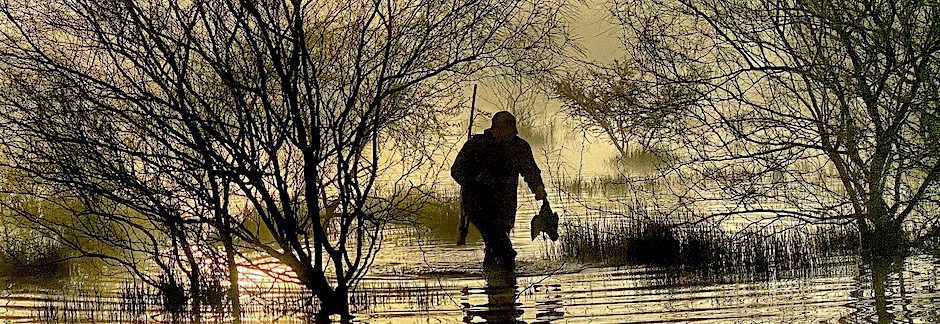MOJO’S Duck Season Somewhere Podcast
Where Geese Fly and Bulls Cry, Colorado

Colorado’s Front Range has a surprisingly good goose hunting and an interesting history. In the small town of Severance, Colorado, the billboard located in town center pretty much spells it out. In today’s episode, Ramsey Russell swings through for a morning goose hunt and lunch, sharing a conversation with locals about why “geese fly and bulls cry” here. Bon appetit.
South Platte River Colorado Flashback

From a small generator-powered cabin nestled beneath whispering cottonwoods on the South Platte River bank, Ramsey Russell meets with Flashback decoy inventor Tyler Baskfield between hunts. In a world slap full of gimmicky duck hunting stuff that usually doesn’t doesn’t perform as intended or last as long as we’d hoped, Baskfield’s new American-made flashback decoy is a genuine ace up the sleeve in the “arms race” of duck hunting gear. In hearing Baskfield’s interesting story, Ramsey learns that what makes the flashback decoy special is not just its patented motion but the Real American duck hunter’s heartbeat that goes into each one. You’ll appreciate that, too, in hearing this incredible conversation among duck hunters.
Related Links:
Waterfowl Hunting Wyoming’s North Platte River

The North Platte River winds it’s way snake-like through the tumbleweed-infused Wild West on its eventual passage to the Gulf of Mexico, making this part of Wyoming a waterfowl-rich area that attracts many mallards and Canada geese. But it’s not the only reason this region has exceptional waterfowl hunting. Wyobraska Waterfowl’s personable JJ Randolph has been hunting and guiding along the North Platte River near here since forever. An incredibly articulate storyteller, he describes the local hunting and culture to Ramsey between the volleys. Fantastic episode!
Related Links:
Buffalo Bill and Cody, Wyoming

Cody, Wyoming, was established in 1895 and epitomizes Wild West Wyoming. It bears Buffalo Bill Cody’s name, but what was his true involvement in the town’s origins? What was the area like when Cody was established, what was the significance of its location, what were some of the local industries, who were some colorfully notable characters? And how’d the Shoshone River derive its name? Taking a brief break from duck blind, Ramsey Russell adds cultural context to his Wyoming duck hunt by meeting with Eric Rossborough, librarian at the Buffalo Bill Center of the West Museum in Cody, Wyoming. Hang on boys and girls, this one bucks around at times like a bareback bronc–and they only scratched the surface of this fascinating topic!
Wyoming Wingmen

As the North American Waterfowl Tour takes him further into Wyoming, Ramsey Russell falls in with Todd Helms, Managing Editor of Eastmans’ Hunting Journal and host of Eastmans’ Wingmen USA podcast. Between a couple epic mornings mallard hunting private stretches of the nearby Shoshone River, Helms tells Ramsey about his waterfowl hunting origins at family “Goose Camp” in Michigan, what life events led him to Wyoming, what duck hunting and living in Wyoming entails. Contemplating the ongoing drought, the 2 duck hunters wonder aloud to themselves where we are as duck hunters and what the future might hold.
Pulling Feathers in Wyoming

After a couple days chasing ducks together, Ramsey Russell discusses Wyoming duck hunting with Levi Kary. Born-and-raised Wyoming, Levi grew up hunting big game with family and only recently began seriously waterfowl hunting. Levi tells about growing up in Wyoming, why duck hunting appeals to him, how he began the Pull ‘N Feathers podcast, and nuances of duck hunting in this part of the US.
Authenticity with Humility: Adventures of Ryan Yarnell

On the banks of an unnamed Montana river absolutely loaded with ducks and geese, Ramsey Russell meets with true friend “Redbeard” Ryan Yarnell after a couple challenging duck hunting days. A couple years in the making, the 2 hunting buddies got way more than they’d bargained, stories to last a lifetime and incentive for another hunt together. Life sometimes happens, but it’s all about playing the hand you’re dealt. Yarnell’s story is living proof. Like hyper-planing over real skinny water down a beautiful Montana river, you never know what’s around then next bend during this episode, but will feel the pounding heartbeat of the absolute hottest up-and-coming brand in waterfowl apparel.
Home for Another Mississippi Opener!

Taking a break from this year’s North America Waterfowl Tour, Ramsey Russell joins son, Forrest Russell and long-time friend Mr. Ian Munn, at camp for the Mississippi duck season opener. They talk about weekend highlights, habitat, life happenings and reminisce about their tradition of sharing the Mississippi Opener for decades.
This Guy Hunts and This Girl Hunts, Eastern Montana

The front porch thermometer read 6 degrees one morning while Ramsey tried filling his swan tag in Eastern Montana. But hunting couple Chad and Tonya Sylvestre from New England had plenty other hunting opportunities to share in an open landscape stretching to all horizons.
Abundant Waterfowl, Endless Hunter Opportunities and Delta Waterfowl, with Dr. Frank Rohwer

Dr. Frank Rohwer grew up duck hunting the Chesapeake Bay, pursued a career in waterfowl-related applied sciences, and is currently President and Chief Scientist for Delta Waterfowl. After spending time together in a North Dakota duck blind, Rohwer and Ramsey Russell discuss Delta Waterfowl’s origins and pertinent North American waterfowl management issues, to include a new proposed management scenario for northern pintails. How’d Rohwer’s earlier hunting experiences influence career direction? What are Delta Waterfowl’s origins? Why are pintail populations struggling? Is the restrictive US pintail bag limit working? Why might increased bag limits be beneficial, and what are the hurdles? How’s the drought going to affect future US bag limits? Does hunter harvest harm duck populations? How does pintail management differ from canvasbacks or mallards? Delta Waterfowl’s vision is abundant waterfowl and endless opportunities for hunters. Never has it been more obvious than in today’s enlightening discussion.




















